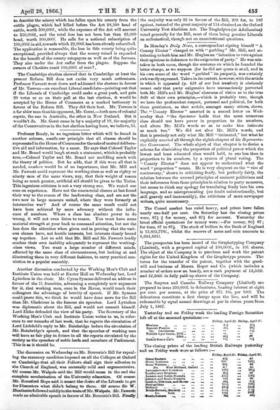Professor Beesly, in an ingenious letter which 'will be found
in :another column, assails our principle that all classes should be represented in the House of Commonsfor the sakeof mutual delibera- tive aid and information, by a sneer. He says that-Colonel Taylor and Mr. Brand would laugh at such a 'statement, which is probably true,—Colonel Taylor and Mr. Brand not meddling much with the theory of politics. But he adds, that if this were all that is needed, numbers would be of no importance, that Mr. 31fill and Mr. Fawcett could represent the working class as well as eighty or -ninety men of the same views, nay, that their weight of reason being so much greater, artificial aid should be given to the Tories. This ingenious criticism is not a very strong one. We rested our case on experience. Have not the commercial classes at last found their way to the reason of the landowning class, and are not the two now in large measure united, where they were formerly at internecine war? And of course the same result could not have been achieved by mere advocacy without the influ- ence of numbers. Where a class has absolute power to do -wrong, it will not even listen to reason. You mast have some material strength at your back to command attention, but not the less does the attention when given end in proving that the vari- , ‘0112 classes have, not hostile interests, but interests closely bound am together. Let us add that Mr. Mill and Mr. Fawcett loudly confess their own inability adequately to represent the working- class views. You want a large number of different minds,' -affected by the same class of circumstances, but looking at and illustrating them in very different fashions, to carry practical eon- aiction to a popular assembly.






























 Previous page
Previous page